The Bible teaches that communion, or the Lord's Supper, is a sacred practice initiated by Jesus during the Last Supper. It symbolizes His body and blood, forming a new covenant for forgiveness and eternal life. It's a time for self-examination, where you reflect on your relationship with God and partake in unity with fellow believers (1 Corinthians 10:16-17). Jesus emphasizes the necessity of this act for spiritual nourishment (John 6:53-54). Ultimately, communion is about remembering Christ's sacrifice and strengthening community bonds. If you're curious about its deeper meanings and implications, there's so much more to explore.
Key Takeaways
- Communion, instituted by Jesus at the Last Supper, symbolizes His body and blood, representing the new covenant for forgiveness of sins (Matthew 26:26-28).
- Participation in communion signifies unity among believers and shared communion in Christ (1 Corinthians 10:16-17).
- Self-examination and repentance are essential before partaking in communion to honor Jesus' sacrifice (1 Corinthians 11:28).
- Communion has roots in the Jewish Passover, reflecting deliverance and the significance of community in worship (Acts 2:42).
- Misunderstanding communion can lead to a lack of reverence, impacting spiritual growth and unity within the church (1 Corinthians 11:27-30).
Introduction

Communion, often referred to as the Lord's Supper, is a foundational practice within Christianity that holds profound significance for believers. Instituted by Jesus during the Last Supper, this sacrament embodies His body and blood, given for humanity's sins. When you take part in communion, you're not just eating bread and drinking wine; you're participating in a deeply spiritual act that signifies the new covenant established through Jesus' blood.
This sacrament serves as a remembrance of Christ's sacrifice and a proclamation of His death until His return. Early Christians recognized its importance, devoting themselves to breaking bread as a way to foster unity among believers.
As you engage in this practice, self-examination becomes essential. The Bible encourages you to reflect on your relationship with God, ensuring you approach communion with reverence and sincerity.
Ultimately, communion offers a promise of forgiveness and eternal life to those who partake. By engaging in this sacred act, you affirm your faith and commitment to Jesus, honoring His sacrifice while looking forward to His return.
This practice isn't merely ritual; it's a profound reminder of the love and grace bestowed upon you.
Essential Scripture References
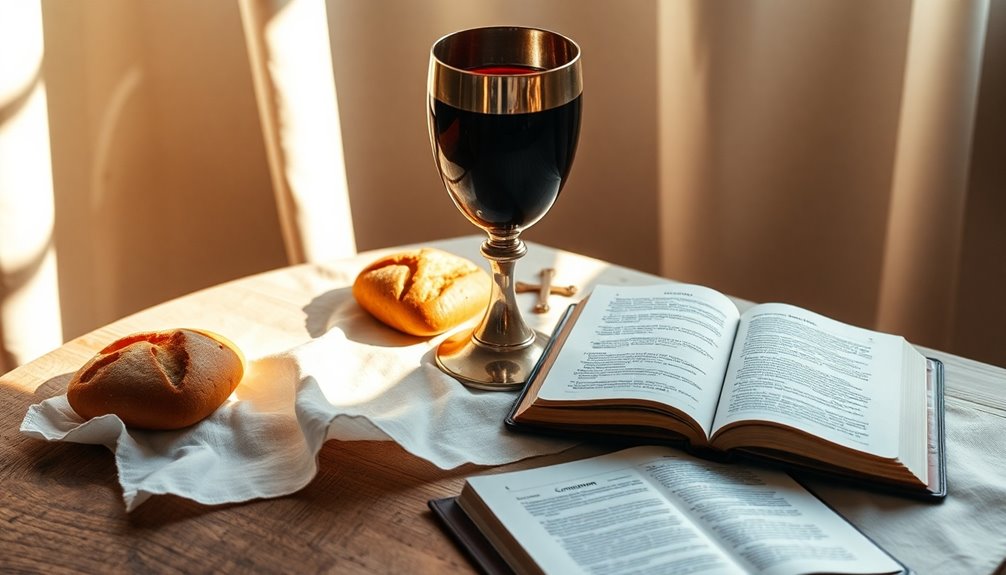
When you explore the essential scripture references on communion, you'll find key passages that shape its meaning and practice.
Primary texts like 1 Corinthians 11:26 and Matthew 26:26-28 highlight the significance of this sacred act.
Additionally, secondary references provide deeper insights into the communal and unifying aspects of sharing in communion.
Primary Bible References
Understanding the significance of communion is deepened by examining key scripture references that highlight its purpose and meaning. In Matthew 26:26-28, Jesus breaks bread and shares the cup, establishing communion as a new covenant for the forgiveness of sins. This act isn't just a tradition; it signifies a profound connection between you and the body and blood of Christ.
In 1 Corinthians 11:23-26, Paul recounts the Last Supper, emphasizing that when you partake in communion, you're remembering Jesus' sacrifice for humanity. This remembrance is vital for your spiritual life, as highlighted in John 6:53-54, where Jesus states that eating His flesh and drinking His blood is essential for eternal life.
Moreover, 1 Corinthians 10:16-17 explains that by participating in the bread and cup, you signify your unity with the Lord and fellow believers.
Finally, Acts 2:42 shows the early church's devotion to breaking bread, reflecting the communal and worshipful essence of communion. These references underscore the importance of communion as a means of grace, unity, and remembrance in your faith journey.
Secondary Bible References
Throughout the New Testament, several secondary scripture references further illuminate the significance of communion in the life of a believer. In Matthew 26:26-28, Jesus institutes the Lord's Supper, using bread to symbolize His body and wine to represent His blood, establishing a new covenant. This act serves as a profound reminder of His sacrifice.
In 1 Corinthians 11:26, you're reminded that partaking in communion is a way to proclaim the Lord's death until He returns, emphasizing its importance.
John 6:53-54 highlights the necessity of eating Jesus' flesh and drinking His blood for eternal life, stressing the spiritual significance of this practice.
Moreover, 1 Corinthians 10:16 points out that your participation in communion signifies a sharing in the body of Christ, fostering unity among believers through this sacred act.
Additionally, Acts 2:42 showcases the early church's commitment to breaking bread, reflecting the communal aspect of worship.
These passages collectively underscore that communion isn't just a ritual; it's essential for nurturing your relationship with Christ and the body of believers.
Passover Origins of Communion
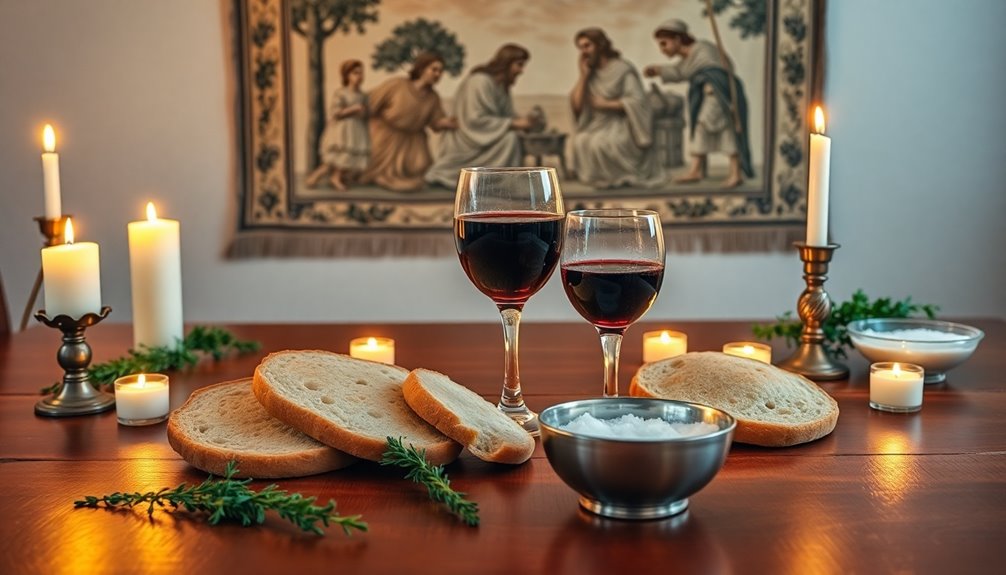
The rich tapestry of Communion finds its roots in the ancient Jewish Passover feast, where Jesus established the Lord's Supper as a transformative covenant with His disciples.
During the Last Supper, He took the traditional elements of the Passover—bread and wine—and infused them with new meaning. As He broke the bread, He declared it to be His body, given for you, symbolizing His ultimate sacrifice. When He shared the wine, He emphasized that it represented His blood, marking the new covenant that would deliver you from sin.
The Passover commemorates the deliverance of the Israelites from slavery in Egypt, paralleling the significance of Jesus' sacrifice as the ultimate deliverance from spiritual bondage. Just as the blood of the Passover lamb protected the Israelites, Jesus' blood provides you with salvation and freedom.
As you partake in Communion, you participate in this profound act of remembrance. The early church embraced this practice, celebrating Jesus' death and resurrection within the context of the Passover tradition, reinforcing the connection between the two sacred observances.
In this way, Communion not only honors Jesus but also aligns with the rich history of God's deliverance.
Symbolism of Bread and Wine
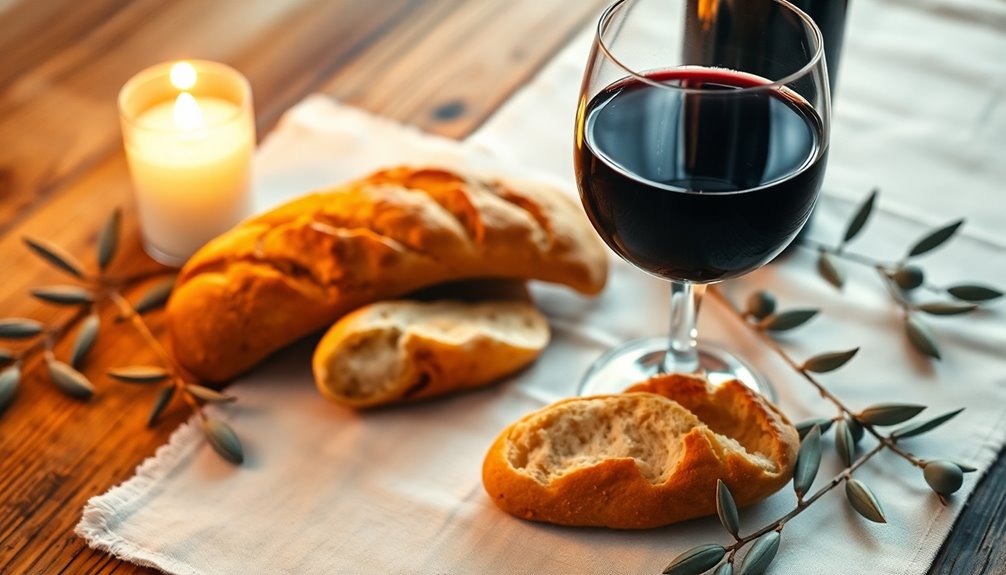
In Communion, bread and wine carry deep symbolism that highlights their significance in your spiritual journey. The bread represents Jesus' body, broken for humanity, as described in Matthew 26:26 and Luke 22:19. When you partake in the bread, you acknowledge the sacrificial love of Christ and His role as the living bread from heaven, essential for eternal life (John 6:51).
The wine symbolizes Jesus' blood, which establishes the new covenant and signifies the forgiveness of sins, as highlighted in Matthew 26:28. Through this act, you participate in a profound spiritual experience, recognizing the importance of unity among believers.
In 1 Corinthians 10:16, participating in the bread and wine signifies a shared communion in Christ's body and blood, fostering a deep connection with others in faith.
Moreover, the act of breaking bread together serves as a reminder of spiritual nourishment and communion with Christ, reinforcing the community of faith (Acts 2:42). This sacred ritual invites you into a deeper understanding of your relationship with Jesus and with your fellow believers, emphasizing the importance of unity and shared spiritual growth.
Misunderstanding Communion's Significance

You might think of communion as just a ritual, but it's much more than that.
It's a profound act that connects you to Jesus' sacrifice and fosters unity among believers.
Understanding its true significance can transform your spiritual journey and deepen your appreciation for this sacred practice.
Debunk Common Misconceptions
Many people misunderstand the significance of communion, viewing it merely as a ritual rather than a deep act of remembrance and proclamation of Jesus' sacrifice. This misconception can lead to a lack of reverence during participation. Jesus emphasized the importance of partaking in His body and blood for eternal life, and failing to grasp this can diminish the sacredness of the act (John 6:53-54).
Another common misunderstanding is thinking communion is only for the spiritually mature. In reality, all believers are called to examine themselves before participating (1 Corinthians 11:28). Ignoring this can result in unworthy participation, which Paul warns can lead to serious spiritual consequences (1 Corinthians 11:27-30).
Additionally, communion isn't just an isolated act; it's a communal experience meant to foster unity among believers. When you take part in communion, you're not just remembering Jesus; you're also proclaiming the Lord's death and reinforcing the bond within the body of Christ (1 Corinthians 10:17).
Misinterpretation of Spiritual Nourishment
Communion holds a deeper significance than often recognized, serving as both a powerful act of remembrance and a vital source of spiritual nourishment. When you partake in this sacred ritual, you're not just engaging in a symbolic act; you're entering into the body of Christ. Jesus said, "Whoever eats my flesh and drinks this cup" is essential for eternal life, highlighting the profound connection you share with Him and other believers.
Misunderstanding communion can lead to divisions among believers, undermining the biblical call for unity. In 1 Corinthians 10:17, Paul emphasizes sharing in the "one loaf," which symbolizes your collective relationship within the body of Christ.
Failing to see communion as spiritual nourishment can cause a lack of self-examination, which is crucial for worthy participation, as advised in 1 Corinthians 11:28-29. It's important to approach communion with reverence, recognizing it as a moment to reflect on the blood of the covenant and your commitment to Christ and fellow believers.
Embracing this sacrament fully can transform your spiritual life and foster deeper unity within the church community.
Reflect on Personal Devotion
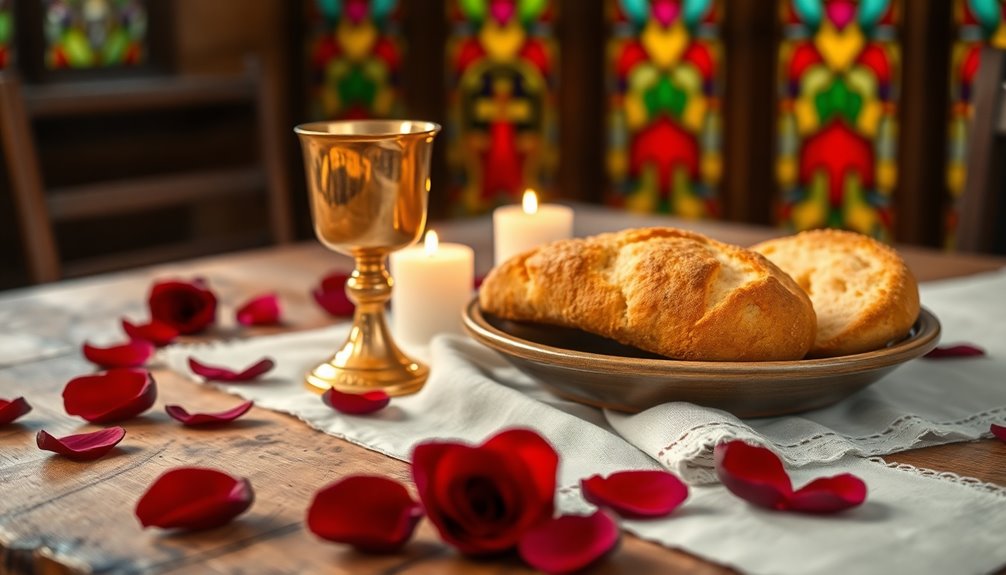
As you prepare for communion, take a moment to examine your heart's readiness and your relationship with God.
Reflecting on your personal journey can enhance your experience and deepen your connection to Christ.
Examine Your Heart's Readiness
Preparation for communion involves a sincere examination of your heart's readiness. Self-examination is crucial, as highlighted in 1 Corinthians 11:28, urging you to reflect on your relationship with God. Recognizing and repenting of personal sin is essential for your worthiness. Psalm 66:18 reminds you not to cherish iniquity in your heart, emphasizing the need for honesty in this process.
Engaging in personal confession and seeking forgiveness is encouraged by 1 John 1:8-9. Acknowledging your sins leads to cleansing, allowing your heart to be prepared for communion.
This spiritual preparation includes meditating on Christ's crucifixion and singing hymns that celebrate His sacrifice, which can deepen your devotion.
As you prepare your heart, remember that communion is a powerful moment to reaffirm your commitment to God. It's a time to express gratitude for Jesus' love and sacrifice.
Congregational Reflection on Communion
Gathering together for Communion offers a unique opportunity for congregational reflection on personal devotion. As you participate, you engage in self-examination, assessing your relationship with God and seeking reconciliation, as emphasized in 1 Corinthians 11:28.
This practice isn't just about individual reflection; it's a communal act of remembrance of Jesus' sacrifice, reinforcing your commitment to the body of Christ.
When you partake in Communion, you're proclaiming your faith and acknowledging the new covenant established through Christ's blood. This act fosters unity within the church, reminding you that you're part of a larger community of believers.
As early Christians demonstrated in Acts 2:42, regular participation in Communion nurtures spiritual growth and strengthens communal bonds.
Your engagement in this sacred act highlights the importance of support among fellow believers. As you gather with others, you collectively remember Christ's sacrifice, reinforcing the significance of unity in the body of Christ (1 Corinthians 10:17).
Communion's Transformative Spiritual Impact
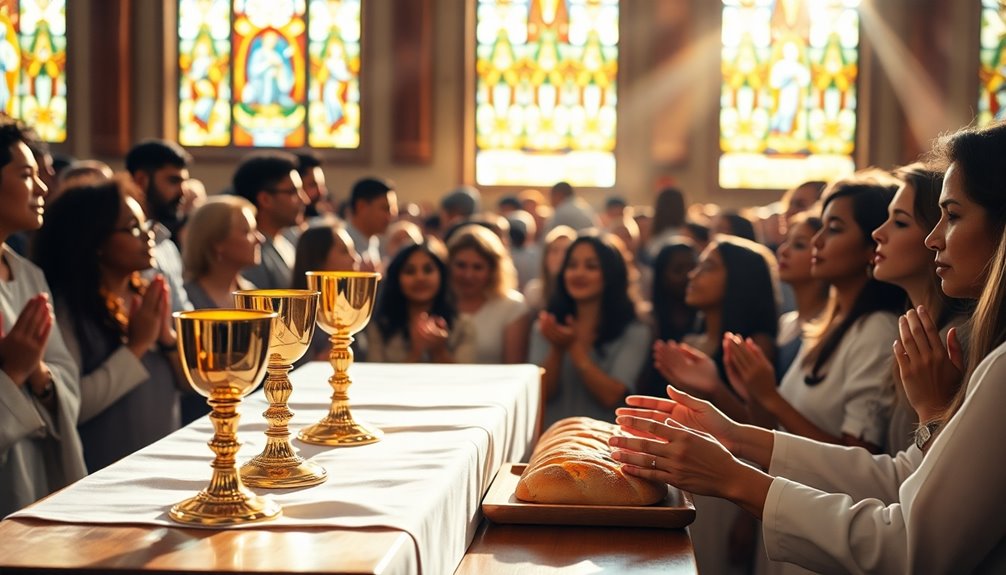
Communion acts as a powerful catalyst for spiritual transformation, inviting believers to deeply reflect on Jesus' sacrifice. When you partake, whether you eat the bread or drink from the cup, you're engaging in a sacred act of remembrance that emphasizes the significance of His body and blood. This participation isn't just a ritual; it symbolizes unity among believers, as described in 1 Corinthians 10:17, where sharing one loaf fosters a collective identity in Christ.
As you approach the Lord's Table, self-examination becomes essential. In 1 Corinthians 11:28, you're reminded to reflect on your heart, ensuring you partake with reverence and integrity. This act of self-discovery prepares you for spiritual nourishment, as Jesus calls Himself the living bread in John 6:35, offering eternal sustenance to all who believe.
Through communion, you connect with the body of Christ, embracing the promise of eternal life. John 6:54 assures that those who partake will be raised on the last day.
This transformative experience not only deepens your faith but strengthens your bond with fellow believers, creating a shared journey toward spiritual fulfillment.
Additional Resources
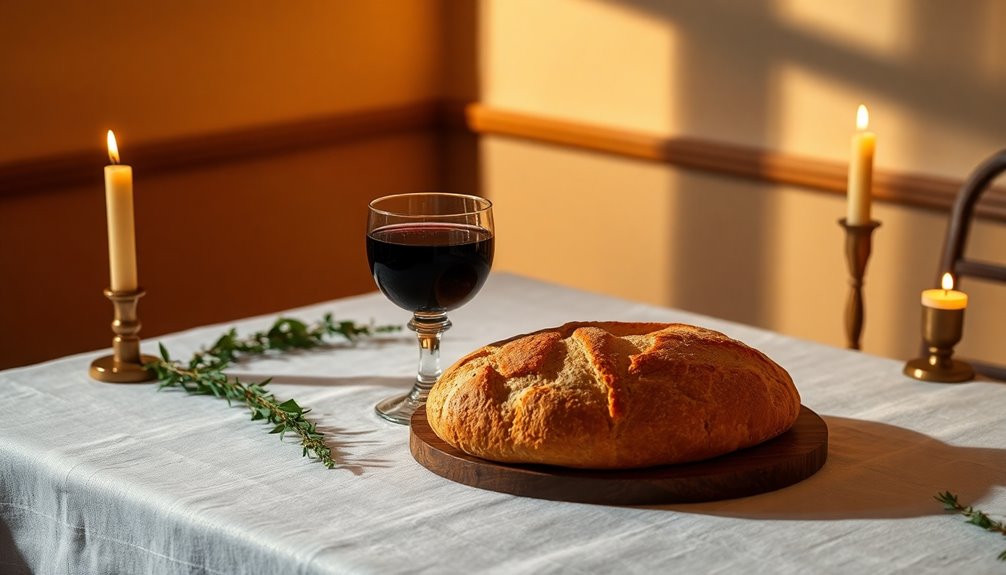
Exploring additional resources can greatly enhance your understanding and appreciation of communion. To deepen your insight, consider studying 1 Corinthians 11:23-26, where Paul emphasizes the importance of remembering the Lord Jesus Christ through the bread that we break and the cup of blessing.
These foundational texts clarify that whoever eats the bread and drinks from this fruit, proclaims the Lord's death until He comes again.
You might also explore the practices of the Early Church in Acts 2:42, where believers devoted themselves to breaking bread together. This shows communion's role in fostering community and unity among Christians, as highlighted in 1 Corinthians 10:16-17.
John 6:53-56 underscores the necessity of partaking in Jesus' body and blood for spiritual nourishment and eternal life. Understanding these connections can prevent you from eating and drinking without discerning the significance of what communion represents.
Finally, researching historical practices can provide context on how communion has evolved while maintaining its essence as a proclamation of faith in Christ's atoning sacrifice.
Frequently Asked Questions
Does the Bible Say We Should Take Communion?
The Bible does emphasize the importance of taking communion.
It's a practice Jesus instituted during the Last Supper, urging His followers to remember Him through the bread and wine.
You'll find that early Christians devoted themselves to this act, highlighting its significance in worship and community.
What Are the Rules for Communion in the Bible?
When considering the rules for communion in the Bible, you should approach it with reverence.
Self-examination is crucial; reflect on your relationship with God before participating.
It's essential to wait for one another and foster a spirit of unity among all participants.
Remember, communion symbolizes the collective body of Christ, so ensuring everyone is in harmony enhances the experience.
Doing this helps you partake in a meaningful and respectful manner.
What Is the Biblical View of Communion?
The biblical view of communion emphasizes remembrance and unity among believers.
You're invited to partake in bread and wine, symbolizing Jesus' body and blood, which fosters fellowship and spiritual nourishment.
It's important to examine yourself before participating, ensuring you approach this sacred act with reverence.
Communion not only honors Jesus' sacrifice but also serves as a proclamation of your faith until His return, reinforcing your connection to the Christian community.
Did Jesus Command Us to Do Communion?
Yes, Jesus did command you to participate in communion.
During the Last Supper, He instructed His disciples to break bread and share wine, symbolizing His body and blood.
This act isn't just a ritual; it's a way for you to remember His sacrifice and affirm your faith.










